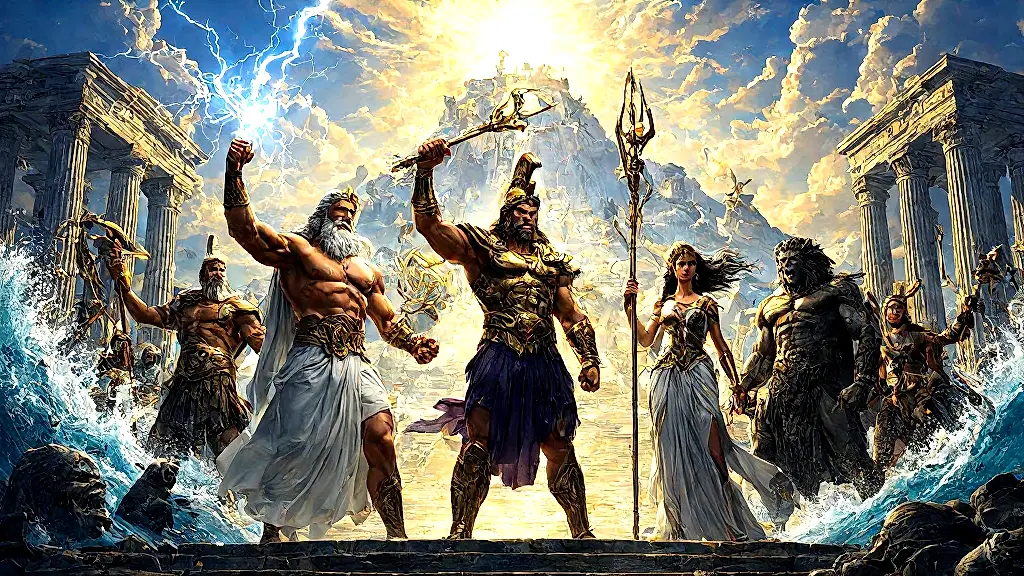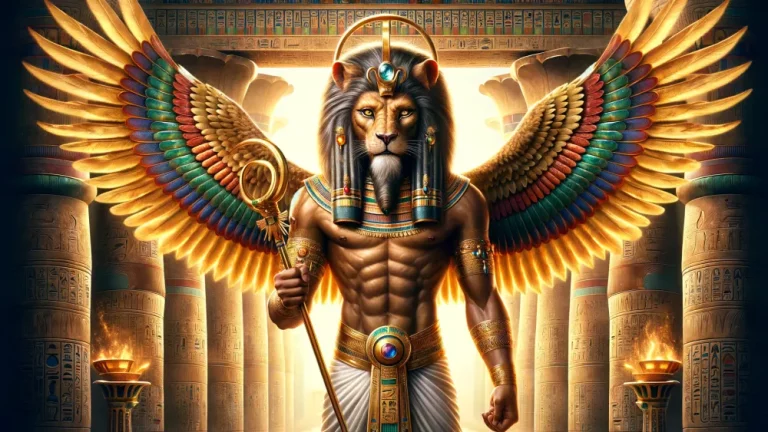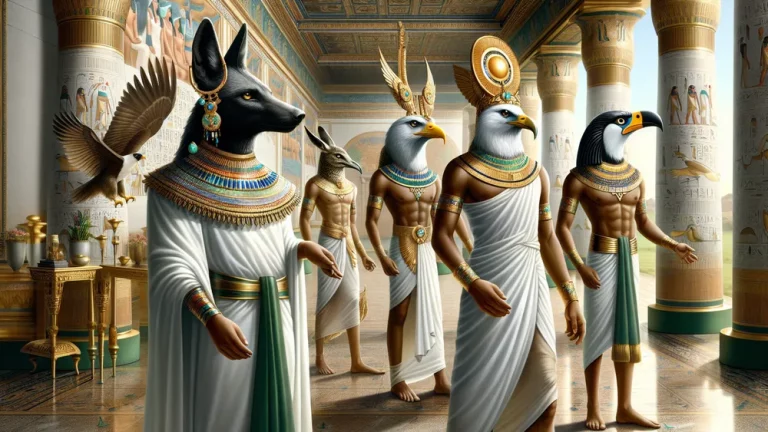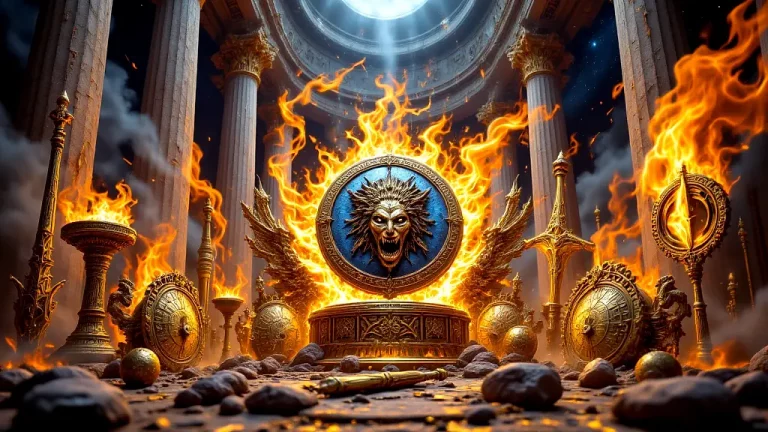Top 10 Strongest Greek Mythology Characters And Their Powers
In Greek mythology, power decides everything. Gods overthrow Titans, and heroes challenge fate. Even the universe shakes when divine battles happen. Have you ever thought about who would win if Zeus fought Typhon? Or why Heracles became a god after his labors? This ranking compares the official strength of gods (like Zeus), Titans (like Cronus), and heroes (like Heracles).
Key Points:
- Zeus is the strongest, with his lightning bolt and rule over gods and men.
- Poseidon controls the seas and earthquakes, using his trident to cause chaos or calm.
- Hades rules the Underworld, with power over the dead and an invisibility helmet.
- Athena, born from Zeus’s head, beats enemies with smart plans, not just strength.
- Heracles did impossible tasks like killing the Nemean Lion, earning godhood later.
- Typhon, a monster, almost beat Zeus but got trapped under a volcano.
- Cronus, the Titan king, ruled the Golden Age before Zeus took over.
We use ancient sources, such as Hesiod’s Theogony and Homer’s epics, for accuracy. Myths sometimes vary – for example, Prometheus‘ punishment differs in Aeschylus’ Prometheus Bound. However, we focus on the most widely accepted versions. Strength here isn’t just physical. It includes Zeus’ control over thunderbolts, Atlas holding the sky, and Athena’s clever strategies. We exclude modern retellings to stay true to ancient beliefs.
Ready to see who ranks as the strongest? Let’s begin.
Top 10 Strongest Greek Mythology Characters: Overview and Key Facts
| Rank | Name | Domain/Role | Key Power/Feat | Primary Source(s) |
|---|---|---|---|---|
| 1 | Zeus | Sky/Thunder, King of Gods | Led the gods to victory in the Titanomachy. Wields a lightning bolt and crushes threats like Typhon. | Hesiod’s Theogony, Homeric Hymns |
| 2 | Poseidon | Seas/Earthquakes | Commands the seas with his trident. Can create storms and earthquakes. | Homer’s Odyssey, Homeric Hymns |
| 3 | Hades | Underworld/Wealth | Rules over the dead. Uses a helmet that makes him invisible and rarely leaves his realm. | Hesiod’s Theogony, Homeric Hymns |
| 4 | Athena | Wisdom/Warfare | She was born from Zeus’ head. A master strategist who helps heroes like Perseus. | Hesiod’s Theogony, Odyssey |
| 5 | Hera | Marriage/Queen of Gods | Curses her enemies, like driving Heracles to madness. Influenced the Trojan War. | Iliad, Bibliotheca (Pseudo-Apollodorus) |
| 6 | Prometheus | Fire/Mankind’s Ally | Stole fire to give to humans. As punishment, an eagle eats his liver daily. | Hesiod’s Theogony, Aeschylus’ Prometheus Bound |
| 7 | Cronus | Time/Former Titan King | Overthrew his father Uranus and ruled the Golden Age. Later lost to Zeus. | Hesiod’s Theogony, Bibliotheca |
| 8 | Heracles | Strength/Hero (Later God) | Completed the Twelve Labors, like killing the Nemean Lion. Eventually became a god. | Bibliotheca, Euripides’ Heracles |
| 9 | Typhon | Chaos/”Father of Monsters” | Almost defeated Zeus before being trapped under Mount Etna. His origins vary. | Hesiod’s Theogony, Homeric Hymns |
| 10 | Atlas | Endurance/Titan | Punished by holding up the sky forever after the Titanomachy. | Hesiod’s Theogony, Odyssey |
Note: Some myths have different versions, like Typhon’s battles in Greek vs. Anatolian stories.
What Makes a Greek Myth Character Strong?
How exactly do we determine their power levels? Here’s how we evaluate their strength.
How We Ranked Them
Power comes in many different types within Greek mythology. We looked at each character based on four main factors: Physical Ability (raw strength like Heracles holding up the sky), Divine Authority (Zeus ruling over other gods), Battle Victories (important wins like Athena defeating Poseidon for Athens), and Control Over Their Domain (Hades’ complete command of the Underworld).
The scoring system below uses a 10-point scale for each category. While some myths have different versions across regions – like the varying accounts of Typhon’s fight with Zeus – we focused on the most widely accepted sources.
| Character | Physical Ability | Divine Authority | Battle Victories | Domain Control | Key Example |
|---|---|---|---|---|---|
| Zeus | 8/10 | 10/10 | 10/10 | 9/10 | Defeated Titans in Titanomachy |
| Heracles | 10/10 | 6/10 | 9/10 | 5/10 | Completed Twelve Labors |
| Athena | 7/10 | 9/10 | 9/10 | 8/10 | Won Athens patronage contest |
| Hades | 6/10 | 9/10 | 7/10 | 10/10 | Absolute ruler of Underworld |
| Typhon | 10/10 | 3/10 | 8/10 | 2/10 | Briefly overpowered Zeus |
Greek gods and heroes are ranked by their strength, leadership, wins in fights, and how well they rule their areas, with Zeus scoring highest overall.
Meet the Top 10 Most Powerful Greek Myth Figures
With our ranking system ready, we’ll now count down the top figures from strong to strongest.
10. Atlas
Atlas was a Titan whom Zeus punished after the Titanomachy by making him hold up the sky forever – not the Earth, which people often get wrong. According to Hesiod’s Theogony, this meant supporting the entire weight of the heavens. Think about the incredible pressure of holding Earth’s atmosphere, then multiply that endlessly.
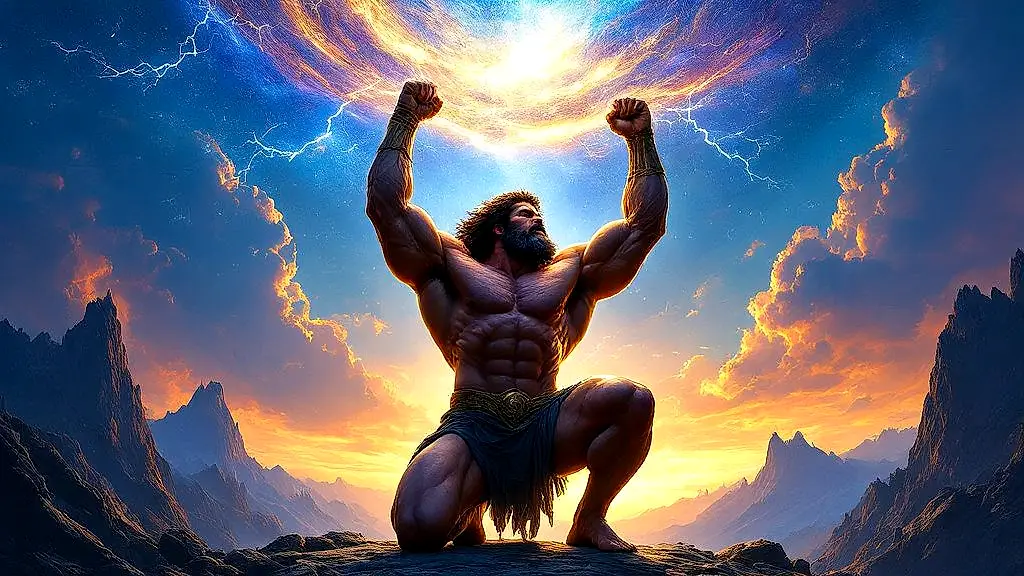
While other Titans used weapons, Atlas showed his power through never-ending endurance. Even the Olympians respected this god-like ability to bear such a huge weight. Some stories say he briefly passed this duty to Heracles during one of the hero’s famous labors, but most versions agree his punishment never truly ended.
9. Typhon
Typhon, called the Father of All Monsters, was created by Gaia to fight the Olympians. He came closer than anyone to defeating Zeus, and in fact was the only creature who ever physically injured the king of gods. Ancient writers like Hesiod describe him as a hundred-headed dragon-snake, though some stories say he had human and animal parts too.
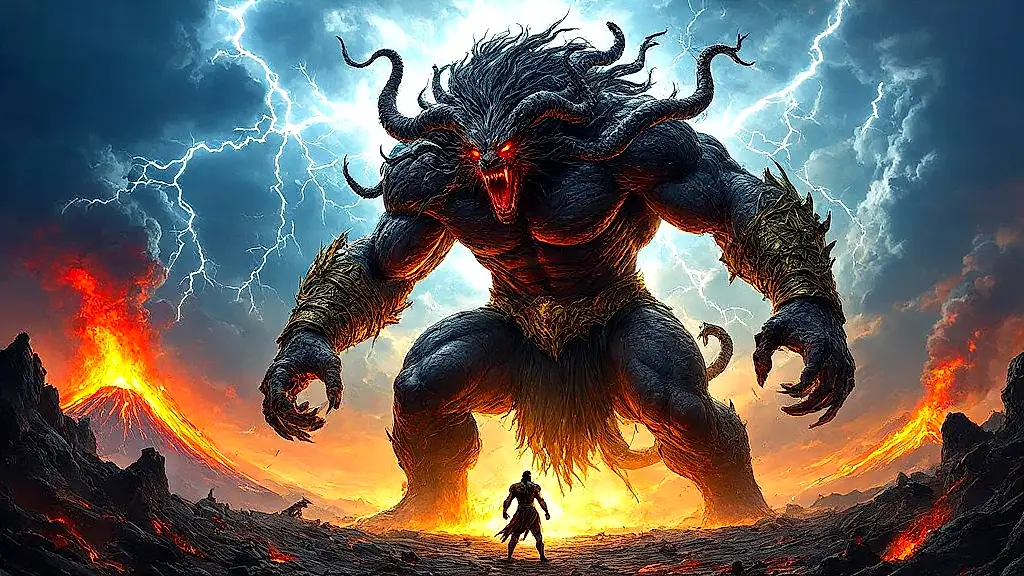
During their huge battle, Typhon actually tore out Zeus’s tendons. The other gods had to help before Zeus finally trapped him under Mount Etna, where his heat still makes the volcano erupt. Unlike others who fought the gods with tricks or rebellion, Typhon was pure, ancient chaos in physical form. Later myths say famous monsters like Cerberus and the Chimera were his children.
That brief moment when he overpowered Zeus makes him the strongest opponent the gods ever faced.
8. Heracles
Heracles (called Hercules by the Romans) was Zeus’s half-god son who worked his way up to full godhood by completing the famous Twelve Labors. These impossible tasks, which Eurystheus assigned to punish him, included some incredible feats:
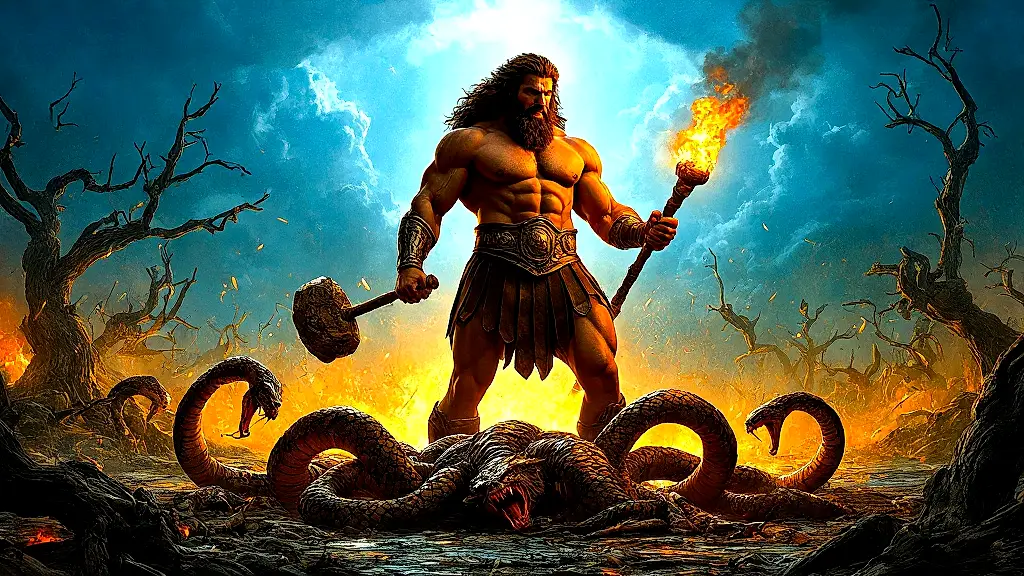
- Killing the Nemean Lion by strangling it (since no weapon could pierce its hide)
- Dragging Cerberus out of the Underworld alive
- Carrying the sky for Atlas while getting the golden apples
- Cleaning the enormous Augean stables all by himself in one day
What’s remarkable is that Heracles did all these superhuman tasks while still mortal. When he became a god after death, he turned out to be the only Greek hero who completely went beyond human limits. Some versions of the stories say he used clever tricks – like fire against the Hydra – but all accounts agree no other mortal could have done what he did.
7. Cronus
Cronus was the youngest Titan who overthrew his father Uranus using a diamond sickle that Gaia gave him. He ruled during the Golden Age, a peaceful time without wars or aging, which showed his complete control over time. His famous scythe represented both farming strength and violent change.
But the same thing happened to him – just as he beat Uranus, his son Zeus defeated him in the Titanomachy after Cronus swallowed his own children to stop the prophecy. Ancient writers say his rule was prosperous but harsh. He became the only figure in Greek myths who both took power by force from the Primordials and then lost it to the Olympians.
Interestingly, some local traditions claimed he still ruled the Blessed Islands after his defeat, keeping his lasting connection to how time repeats itself.
6. Prometheus
Prometheus was the clever Titan who went against Zeus’s orders to give humans fire, which he hid in a fennel stalk according to Hesiod. His punishment showed incredible endurance – Zeus had him chained to Mount Caucasus where an eagle ate his liver every day. What made this torture worse was that his liver grew back each night, only to be eaten again the next day.
Some stories say this lasted for 30,000 years until Heracles’ intervention finally freed him. What’s more, even while suffering this never-ending torment, Prometheus kept defying Zeus. The plays of Aeschylus show him refusing to reveal Zeus’s dangerous prophecy despite his pain. The fire he stole wasn’t just a tool – it gave humans what they needed to build civilization.
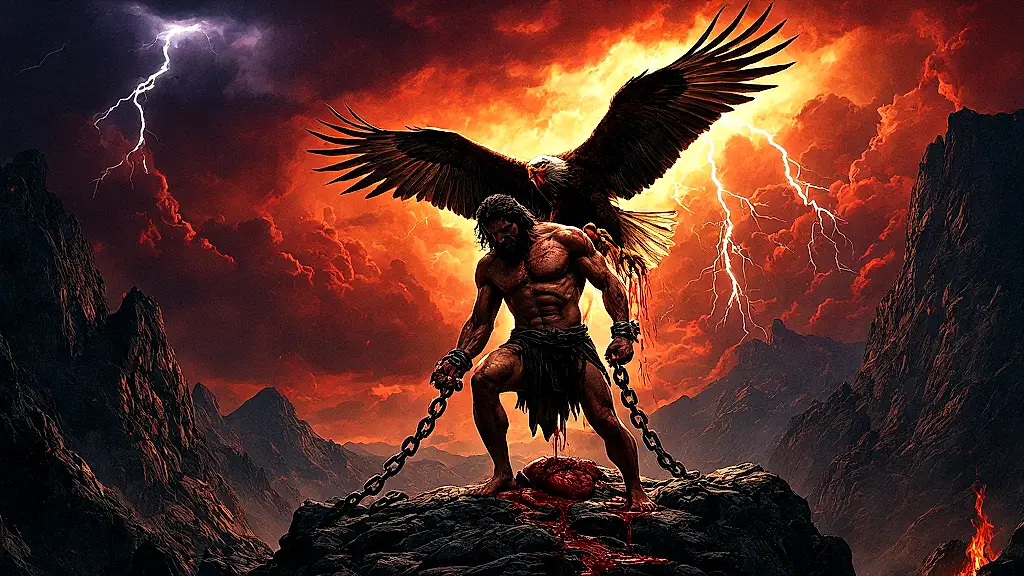
Interestingly, some local myths say Prometheus actually created humans from clay, making him both their maker and their helper who suffered for them. His strength wasn’t physical power, but his ability to withstand endless suffering while never giving in.
Prometheus endured endless torture by Zeus, having his liver eaten daily only for it to regrow, yet he never stopped helping humans or defying the gods.
5. Hera
Hera became Queen of the Gods through her marriage to Zeus, which gave her enormous power as a goddess. She showed this power when she drove Heracles insane, making him kill his own family, and when she never stopped working against Troy after Paris picked Aphrodite over her in the Judgment of Paris.
While other gods ruled over specific things like war or wisdom, Hera’s power came from being the most important female goddess. For example, she could change the course of wars by distracting Zeus to help the Greeks. She punished people across generations, like making Leto’s childbirth take much longer when having Apollo and Artemis. Hera also transformed mortals, such as turning Io into a cow.
People in Argos and Samos worshipped her as both a protector of marriage and a strict guardian of divine rules. Interestingly, some stories say Hera once tried to overthrow Zeus, showing she had political ambitions among the gods. Even though this rebellion failed, it proves how powerful she was as the Olympians’ matriarch. Her actions always protected her position and enforced what she thought was right.
4. Athena
Athena had a dramatic birth – she sprang out fully armored from Zeus’s forehead after he swallowed her mother Metis. Some stories say Hephaestus had to split Zeus’s head open with an axe first.
She represented clever battle tactics and wisdom, which she showed when helping Perseus defeat Medusa by telling him to use a polished shield as a mirror to avoid her stone-turning gaze. Unlike Ares who relied on brute strength, Athena’s power showed itself in smart strategies. For instance, she came up with the Trojan Horse plan that won the Trojan War.
She taught Bellerophon how to control Pegasus, and won Athens for herself by giving the olive tree gift when competing with Poseidon. Every time she got involved, she combined fighting skills with superior thinking. Interestingly, some local traditions like her Libyan origin story as Tritogeneia suggest she might have been a warrior goddess even before becoming part of Greek religion.
Athena was the only Olympian who could consistently beat both gods and monsters by being smarter than them. Her solutions always mixed courage with careful planning, making her uniquely powerful among the gods.
3. Hades
Hades was the complete ruler of the Underworld, controlling armies of dead souls and fearsome guards like Cerberus, his three-headed dog. The Helm of Darkness, made by the Cyclops, could make him invisible to other gods – it was so powerful that even Athena and Perseus borrowed it for important battles.
Unlike his brothers and sisters on Olympus, Hades almost never left his underground realm, which made his rare appearances above ground especially dramatic. His most famous surface appearance happened when he burst out of the ground in a black chariot to take Persephone, creating important religious traditions through their marriage.
What’s interesting, even other gods avoided saying his real name, using titles like “Plouton” (The Rich One) instead. When living heroes like Heracles or Orpheus entered his domain, they had to obey his rules completely – no mortal could question his decisions. In some places, people saw Hades differently. At Eleusis, where he was part of agricultural cycles through Persephone’s yearly return, they viewed him more kindly.
The few temples dedicated to Hades, like the Necromanteion of Ephyra, were special because people built them over caves thought to be entrances to his realm. This showed his unique link with the living world, making him different from all other Greek gods. His power over death was so absolute that no one, not even gods, could challenge it.
2. Poseidon
Poseidon’s bronze trident was made by the Cyclops during the war against the Titans. With just one strike, it could either calm the seas or make them rage violently. This same weapon could split mountains open and create new springs.
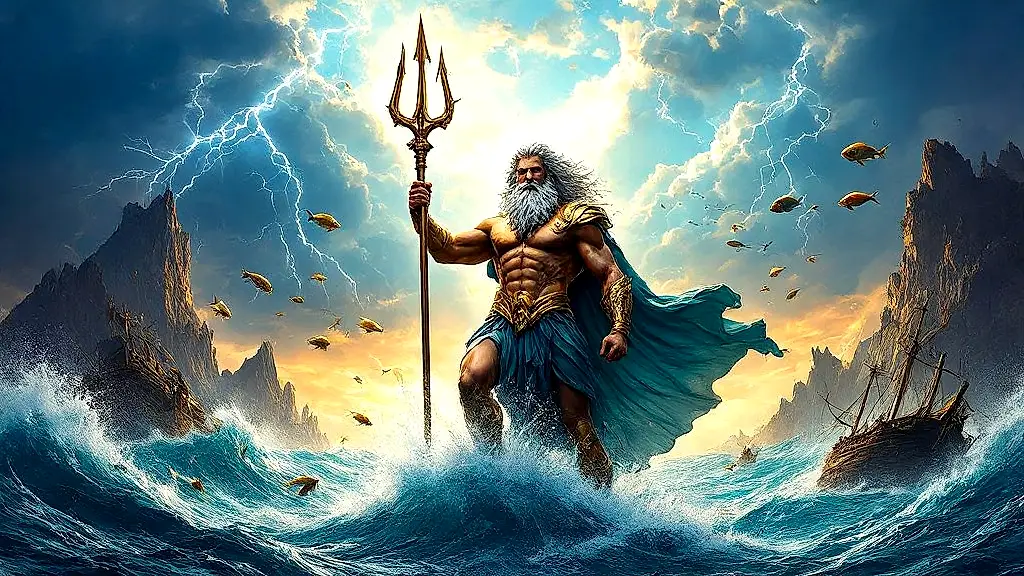
When he competed with Athena to be Athens’ patron, he hit the Acropolis with his trident to make a saltwater spring – though some stories say he made the first warhorse instead. This showed he ruled both sea and land. The Earth-Shaker showed his anger most clearly in Homer’s Odyssey. After Odysseus blinded his son Polyphemus, Poseidon spent ten years making Odysseus suffer. He created storms that wrecked ships and left heroes stranded.
What’s more, he affected real Greek life too. Coastal cities like Corinth built temples on fault lines to please him, and sailors made special offerings before trips. Interestingly, some traditions from Boeotia say Poseidon created the first tame horses. This proves his power connected wild and tame things. During the Trojan War, he supported Troy because Laomedon had cheated him earlier.
This put him against Athena who backed the Greeks, showing even gods held onto their anger for a long time. His rivalry with Athena reflected Greece’s own struggle between sea trade and farming ways of life.
1. Zeus
Zeus’s thunderbolt was made by the Cyclopes after he freed them from Tartarus. It stood as the clearest sign of his power, able to blast whole mountains apart and punish any god who rebelled against him. During the ten-year Titanomachy war, he showed his smart leadership by freeing the Hundred-Handed Giants to help defeat Cronus’s army.
After winning, he split control over the world with his brothers – Poseidon got the seas, while Hades took the underworld. Even powerful monsters couldn’t stop Zeus for long. When Typhon attacked and cut his muscles, Zeus eventually overcame him by mastering how to use storms in battle. This proved nothing could truly threaten his rule. He kept complete power through strict divine laws and prophecy systems.
At Dodona, his sacred oak tree gave messages to humans, and he worked with the Moirai (Fates) to keep the world balanced. What’s interesting, not even Zeus could change what the Fates had decided. His punishments became famous across Greece. He chained Prometheus to a rock for stealing fire, made Sisyphus push a boulder forever, and even tied up Hera when she turned against him.
In some places like Crete, people told different stories where Zeus “died” each year, showing he might have started as a nature god before becoming the supreme Olympian. Zeus’s power wasn’t only about destruction. He protected important customs like xenia (guest friendship) and kept kings in authority. His Aegis shield could scare enemies or defend heroes like Perseus.
While other gods ruled specific areas, Zeus’s influence reached into all parts of life – from storms to kingship. This is why Greeks everywhere called him “Father of Gods and Men.” His many titles, like Olympios (sky ruler) or Horkios (oath protector), show how completely he represented absolute power to the ancient Greeks.
Zeus became the top god by winning wars, mastering storms, and setting divine rules, but even he couldn’t change fate.
Almost Made the Cut
These powerful gods just missed making the top 10, though each showed great strength in their own areas. Ares represented war’s pure spirit, though he often got beaten – even by the mortal Diomedes when Athena helped him. Meanwhile, Hecate kept being worshipped from earlier times unlike other Titans, ruling magic with her three forms.
Another late addition was Dionysus, whose wild rituals made whole cities go insane, like when Pentheus suffered this fate. Nike appeared in every godly battle as winged victory herself, yet never acted alone. Finally, Helios drove the sun chariot and saw everything, even catching Aphrodite with Ares in secret. Each of these deities had impressive power, but just fell short of the very top.
FAQs
1. Who is the strongest Greek god?
The strongest Greek god is Zeus, supreme ruler of Olympus and wielder of the thunderbolt.
2. Can mortals rival gods in strength?
Mortals can rival gods in strength, as proven by Heracles, whose labors earned him apotheosis.
3. How does Zeus compare to Odin?
Zeus compares to Odin in raw power by surpassing him in Greek sources as the undisputed king of gods, while Odin rules through wisdom and war in Norse myth.
4. Who was the strongest Titan?
The strongest Titan was Cronus, who overthrew Uranus and ruled during the Golden Age before Zeus.

